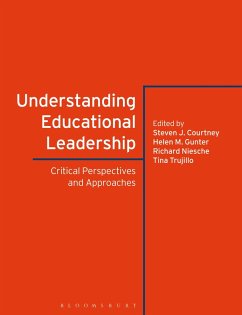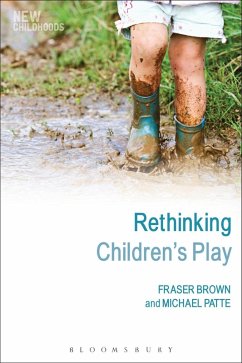
Rethinking Educational Leadership (eBook, PDF)
From improvement to transformation
Versandkostenfrei!
Sofort per Download lieferbar
49,95 €
inkl. MwSt.
Weitere Ausgaben:

PAYBACK Punkte
25 °P sammeln!
John West-Burnham offers a radical critique of prevailing models of leadership in education, particularly models of school leadership, notably the British view of headship. For almost a generation, school leadership has been focused on the concept of improvement, within a policy context of improvement and a prevailing culture rooted in incremental adjustment rather than a fundamental reappraisal.Transformation is a particularly evocative concept; it is one of those words that it is almost impossible to raise objections to. However, as is so often the case with such words, its power is often p...
John West-Burnham offers a radical critique of prevailing models of leadership in education, particularly models of school leadership, notably the British view of headship. For almost a generation, school leadership has been focused on the concept of improvement, within a policy context of improvement and a prevailing culture rooted in incremental adjustment rather than a fundamental reappraisal.
Transformation is a particularly evocative concept; it is one of those words that it is almost impossible to raise objections to. However, as is so often the case with such words, its power is often proportionate to the ambiguity with which it is used. In the context of a discussion about transforming schools three broad categories of usage might be identified: transformation as improved performance, transformation as the achievement of optimum effectiveness and transformation as profound change. It is in this latter respect that the book will offer an alternative model of leadership. Transformation is not about improving output or efficiency; it is not about incremental improvement or optimising organizational effectiveness. Transformation is rather about the profound change of every component of the organization following a fundamental reconceptualisation of its purpose and nature. Transformation is a process that ensures that an organization is appropriate to the context in which it operates. Transformation is about questioning the very nature of the school as an organization and the nature of organizations.
The distinctive nature of this book is that it will focus on leadership attitudes, values and personal qualities (the elusive and intangible elements of leadership) rather than simply reworking the traditional blend of knowledge, skills and experience. Central to the book will be the notion of the personal 'mind map' - the model of leadership that determines personal behaviour. The book will focus on helping leaders review and reconceptualise their personal mindscapes.
The book will have a strongly practical focus and is designed to be a resource for school leaders who find that their work is increasingly moving beyond traditional boundaries into areas for which there are few precedents and only limited resources.
Transformation is a particularly evocative concept; it is one of those words that it is almost impossible to raise objections to. However, as is so often the case with such words, its power is often proportionate to the ambiguity with which it is used. In the context of a discussion about transforming schools three broad categories of usage might be identified: transformation as improved performance, transformation as the achievement of optimum effectiveness and transformation as profound change. It is in this latter respect that the book will offer an alternative model of leadership. Transformation is not about improving output or efficiency; it is not about incremental improvement or optimising organizational effectiveness. Transformation is rather about the profound change of every component of the organization following a fundamental reconceptualisation of its purpose and nature. Transformation is a process that ensures that an organization is appropriate to the context in which it operates. Transformation is about questioning the very nature of the school as an organization and the nature of organizations.
The distinctive nature of this book is that it will focus on leadership attitudes, values and personal qualities (the elusive and intangible elements of leadership) rather than simply reworking the traditional blend of knowledge, skills and experience. Central to the book will be the notion of the personal 'mind map' - the model of leadership that determines personal behaviour. The book will focus on helping leaders review and reconceptualise their personal mindscapes.
The book will have a strongly practical focus and is designed to be a resource for school leaders who find that their work is increasingly moving beyond traditional boundaries into areas for which there are few precedents and only limited resources.
Alle Preise in Euro und inkl. der gesetzl. MwSt. | Innerhalb Deutschlands liefern wir preisgebundene Bücher versandkostenfrei. Weitere Informationen: bitte hier klicken
Support
Bitte wähle dein Anliegen aus:
Rechnungen
Bestellstatus
Retourenschein
Storno













